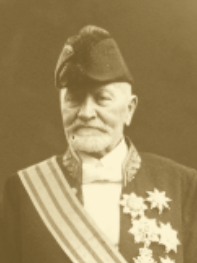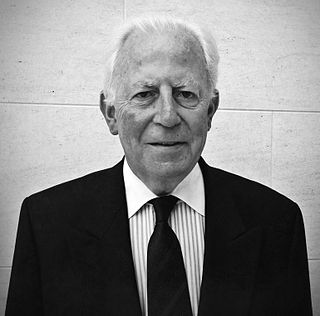
The Thilges Ministry formed the government of Luxembourg from 20 February 1885 to 22 September 1888.

The Thilges Ministry formed the government of Luxembourg from 20 February 1885 to 22 September 1888.
Speculations on the stock market, which appeared like insider trading, brought about the fall of the Blochausen government. [2] After the press revealed the suspicious transactions, the King-Grand Duke asked his Prime Minister to resign. [2] He charged Emmanuel Servais with forming a new government. [2] The latter suggested instead Édouard Thilges who, after some hesitation, took over a government that was devoted to continuity. [2]
With the exception of the bankruptcy of the Banque Fehlen & Cie in 1886, which had not recovered from the losses from the fall of the Banque nationale, the period of 1885-1889 went over without conflicts. [1] The public finances under Mathias Mongenast were improved. [1] The development of the Zollverein and the boom of the steel industry assured ever-growing revenues for the State. [1] Important resources were invested in the expansion of the network of local railways. [1] As an authentic liberal, Édouard Thilges advocated the non-intervention of the state in the functioning of the economy, even when some sectors ran into difficulties: "The government must lend support to all measures which may encourage the development of industry and trade in a general manner; but it must not intervene in favour of particular businesses […]. If we did something for one establishment ruined through their own fault, what would be our position towards other establishments, towards individuals who due to unexpected events find themselves in a difficult situation?" [1]

Paul Eyschen was a Luxembourgish politician, statesman, lawyer, and diplomat. He was the eighth Prime Minister of Luxembourg, serving for twenty-seven years, from 22 September 1888 until his death, on 11 October 1915.
Charles-Mathias Simons was a Luxembourg politician and jurist. He was the third Prime Minister of Luxembourg, serving for seven years, from 1853 until 1860.

Baron Félix de Blochausen, was a Luxembourgish politician. An Orangist, he was the sixth Prime Minister of Luxembourg, serving for ten years, from 26 December 1874 until 20 February 1885.

Jules Georges Édouard Thilges was a Luxembourgish politician. He was the seventh Prime Minister of Luxembourg, serving for over three years, from 20 February 1885 until 22 September 1888.

Victor Thorn was a Luxembourg politician. He was the 11th Prime Minister of Luxembourg, serving for one year, from 24 February 1916 until 19 June 1917.

Léon Kauffman was a Luxembourgish politician. He was the 12th Prime Minister of Luxembourg, serving for one year, from 18 June 1917 until 28 September 1918.

From August 1914 until the end of World War I on 11 November 1918, the Grand Duchy of Luxembourg was under full occupation by the German Empire. The German government justified the occupation by citing the need to support their armies in neighbouring France, although many Luxembourgers, contemporary and present, have interpreted German actions otherwise.
The Liberal League was a political party in Luxembourg between 1904 and 1925. It was the indirect predecessor of the Democratic Party (DP), which has been one of the three major parties in Luxembourg since the Second World War.

The Santer-Poos Ministry II was the government of Luxembourg between 14 July 1989 and 13 July 1994. It was the second of three led by, and named after, Prime Minister Jacques Santer. Throughout the ministry, the Deputy Prime Minister was Jacques Poos.
The Dupong-Schaus Ministry was the government of Luxembourg between 1 March 1947 and 3 July 1951. It was a coalition between the Christian Social People's Party (CSV), and the Democratic Group.

The Tornaco Ministry was in office in Luxembourg from 26 September 1860 until 3 December 1867. It was reshuffled six times.

The Blochausen Ministry was the government of the Grand Duchy of Luxembourg from 26 December 1874 to 20 February 1885. It was led by Baron Félix de Blochausen.
The Prüm Ministry took office in Luxembourg on 20 March 1925. It was formed after the Chamber elections of 1 March 1925 and was supported by the Independent National Party, the Liberals, the Socialists and elements of the Party of the Right. It resigned on 16 July 1926, as the Liberals and Socialists could not agree over a bill for workers' holiday.
The Mongenast Ministry was only in office in Luxembourg for 25 days, from 12 October to 6 November 1915.
The Loutsch Ministry was in office in Luxembourg from 6 November 1915 to 24 February 1916.
The Reuter Ministry was the government in office in Luxembourg from 28 September 1918 until 20 March 1925. It resulted from the Chamber elections of 28 July and 4 August 1918 and was reshuffled on 5 January 1920 as a result of the elections of 26 October 1919. There was a further reshuffle on 15 April 1921, when the Liberals left the government.

The Servais Ministry was in office in Luxembourg from 3 December 1867 to 26 December 1874. It was reshuffled four times.
The Simons Ministry was in office in Luxembourg from 23 September 1853 to 26 September 1860. Initially it just consisted of three members of the government, to which two more were added on 23 September 1854.

The Eyschen Ministry was in office in Luxembourg for 27 years, from 22 September 1888 to 12 October 1915. It was headed by Paul Eyschen, and ended with his death.